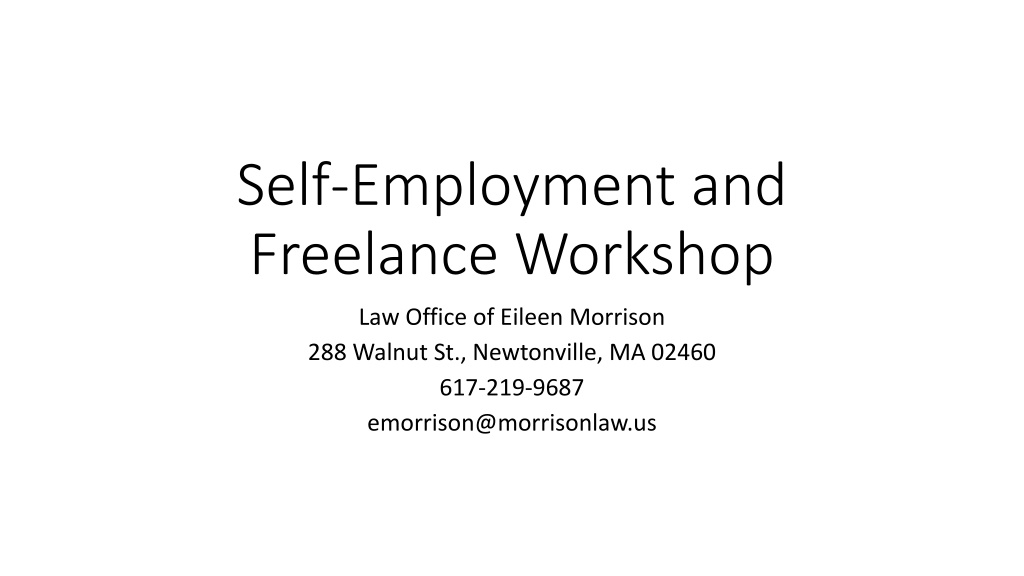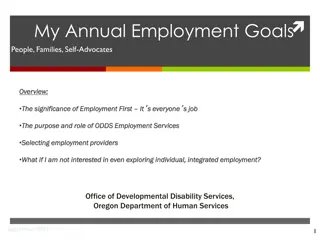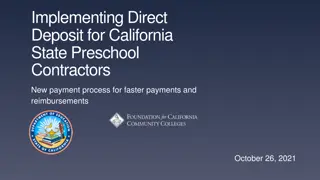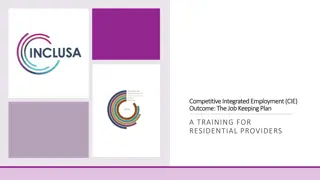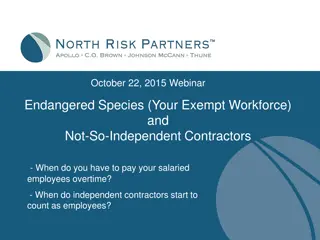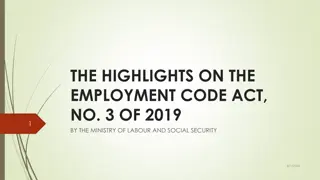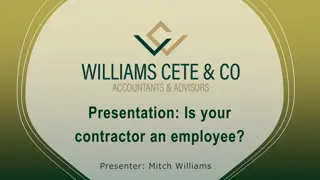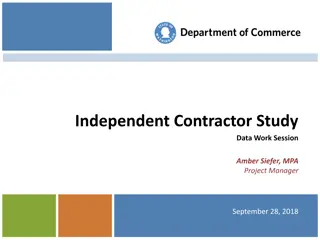Understanding Self-Employment and Independent Contractors
Learn about the distinction between self-employment and being an independent contractor, including the criteria for classification, tax implications, and the consequences of misclassification. Discover the right to control in determining worker classification and the potential legal repercussions for misclassifying workers.
Download Presentation

Please find below an Image/Link to download the presentation.
The content on the website is provided AS IS for your information and personal use only. It may not be sold, licensed, or shared on other websites without obtaining consent from the author. Download presentation by click this link. If you encounter any issues during the download, it is possible that the publisher has removed the file from their server.
E N D
Presentation Transcript
Self-Employment and Freelance Workshop Law Office of Eileen Morrison 288 Walnut St., Newtonville, MA 02460 617-219-9687 emorrison@morrisonlaw.us
Who is self-employed? Generally, you are self-employed if any of the following apply to you: You carry on a business as a sole proprietor or an independent contractor. You are a member of a partnership that carries on a business. You are otherwise in business for yourself (including a part-time business). Source: https://www.irs.gov/businesses/small-businesses-self- employed/self-employed-individuals-tax-center
Who is an independent contractor? You are not an independent contractor if you perform services that can be controlled by an employer (what will be done and how it will be done). This applies even if you are given freedom of action. What matters is that the employer has the legal right to control the details of how the services are performed. If an employer-employee relationship exists (regardless of what the relationship is called), you are not an independent contractor and your earnings are generally not subject to Self-Employment Tax. However, your earnings as an employee may be subject to FICA (Social Security tax and Medicare) and income tax withholding. Source: https://www.irs.gov/businesses/small-businesses-self- employed/independent-contractor-defined
If an employer misclassifies an independent contractor as an employee: If an employee is classified by the employer as an independent contractor and there is no reasonable basis for doing so, the employer may be held liable for employment taxes for that worker (the relief provisions, discussed below, will not apply). See Internal Revenue Code section 3509 for more information. When in doubt, consult a labor and employment attorney.
Who is an independent contractor? Who is an employee? If you are a business owner hiring or contracting with other individuals to provide services, you must determine whether the individuals providing services are employees or independent contractors. But in general, If you are a business owner or contractor who provides services to other businesses, then you are generally considered self-employed. For more information on your tax obligations if you are self-employed (an independent contractor). Source: www.irs.gov
Right to control If the worker performs services that can be controlled by an employer (what will be done and how it will be done). This applies even if you are given freedom of action. What matters is that the employer has the legal right to control the details of how the services are performed. If so, the worker should be classified as an employee. Source: www.irs.gov
What can an F-1 student do on OPT? You can be an: A. Unpaid volunteer for a nonprofit; B. Part-time or full-time employee; C. Work for hire/freelance/independent contractor often working on a specific project; D. Self-employed business owner; E. Could be an employee of a business you own.
H-1B beneficiaries: MUST be full-time or part-time employees. They are never allowed to accept employment except for their H-1B employer. If you want to work for another employer, you need a second H-1B to be filed. H-1B employer may not be owned by the beneficiary. Any ownership must be disclosed and more than 5% ownership is problematic.
TN-1 beneficiaries TN-1 is for a particular company and no additional employment is allowed. Management consultants could be employees or not; depends on how the job is defined.
O-1B beneficiaries Look at the petition. Must comply with the terms of the petition. An O-1B can be constructed for the Beneficiary to be an employee or an independent contractor. Can use an itinerary to authorize work for other employers in addition to the petitioner. Must be similar workstreams to those in the original petition. 8 CFR 214.2(o)(2)(iv)(D). The petitioner may be owned by the beneficiary. Must disclose the ownership interest.
E-2 Treaty Investors https://travel.state.gov/content/travel/en/us-visas/visa-information- resources/fees/treaty.html lists the countries with E-2 treaties with the US. Only citizens of these countries may file E-2 visa. The investor has to be coming to the US to develop and direct their investment in an active business. Could be a new business or the purchase of an existing business. The E-2 investor must be placing capital at risk and show how they got the money legally to invest. The Treaty investor must have control over the capital invested. The investment must be sufficient for the type of business invested in.
E-2 Treaty Investors The E-2 investor has to have the skills necessary to develop and direct their investment. The investment has to be sufficient to insure the treaty investor s financial commitment to the successful operation of the business; The business must have the present or future capacity to generate more than enough income to support the treaty investor and family. The E-2 business can also hire other people from the E-2 investor s country as executives, supervisors and specialized knowledge employees.
Creating a business Carefully think through control. Get some legal advice. Make sure the form of the business suits you, that you are properly licensed and insured and that you get a tax ID # (like a social security number for a business. Get some tax advice, and make your tax payments on time. You may invest in a business but you cannot work in a business without the correct work authorization. Investing money in a US business not require a work visa but developing and directing the investment does.
Creating a business USCIS is not that fond of the single member LLC (limited liability corporation). They will sometimes look behind it and say that it amounts to self-employment. The beneficiary cannot sign off on his or her own visa paperwork Can use a general counsel, accountant or other employee to sign off. You should be working with a visa plan that will work for your situation.
